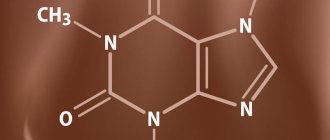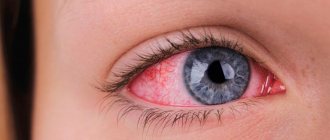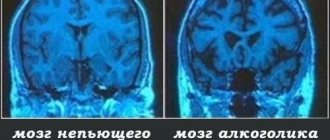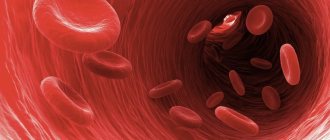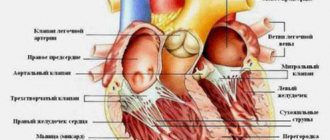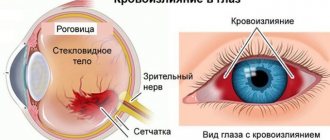Home>Articles>Effects of ethanol on blood vessels
quick menu (hide)
- Alcohol and blood vessels
- Effect on cerebral vessels
- Effect on the central nervous system
- The mechanism of action of alcohol
- Causes of vasoconstriction
- Pathologies caused by alcohol
- Brief effects of alcohol
- Consequences of frequent drinking
After drinking alcohol, a short-term positive effect is observed. Alcohol and blood vessels interact and the person’s condition improves. But it doesn't last long.
Alcohol constricts or dilates blood vessels
In the first few moments, alcohol acts as a vasodilator. There is also an additional burden on the cardiovascular system. The number of heart contractions increases. This leads to an increase in the volume of pumped liquid. This state of affairs can have a negative impact on human health.
In a matter of moments, alcohol enters the bloodstream and stays there for up to seven hours. The pulse quickens, blood circulation and metabolism are impaired.
Additional doses of hormones are released into the blood:
- adrenaline,
- norepinephrine.
This has an adverse effect on the psyche, causing stress and mental disorders.
Strong liquor
It doesn’t matter what kind of alcohol was drunk - strong or weak, the effect of alcohol on blood vessels depends on the following circumstances:
- volume of alcohol consumed (large amounts of alcohol increases blood pressure),
- a person’s age (with age-related weakening of health, the effect of alcohol on the kidneys and liver only increases),
- regularity of libations.
Complete 100% abstinence should be recommended for those who suffer from vegetative-vascular disorders, neuroses, and diseases of the endocrine system.
Traditional medicinal recipes
Although cognac itself is not the best remedy for strengthening blood vessels, it is an excellent basis for folk recipes. The most effective among them are:
- cognac tincture with cranberries;
- tea with cognac and cinnamon.
Cranberry tincture
Cranberries are good for the heart and blood vessels, as they contain a large amount of vitamin C and phenolic antioxidants, which lower cholesterol levels and strengthen blood vessels. Prepare a cranberry cleanser as follows:
- Rinse 600 grams of cranberries under running water, place on a paper towel and mash a little (covering with another towel on top);
- then transfer it to a jar, cover the top with gauze and leave it like that for a day;
- Next - transfer the berries to an enamel bowl, add about 1 - 1.5 glasses of water and heat in a water bath until boiling;
- after cooling, strain through cheesecloth;
- add 500 milliliters of cognac to the resulting broth.
Take 30 milliliters before dinner . The course is at least 2 weeks.
Also watch this recipe video:
The remaining berries should not be thrown away. It is better to pour 1 liter of vodka over them and let them brew for 1 week in the cellar or in the refrigerator. The resulting tincture is no worse than expensive wine.
Adding to tea
It is considered the best tonic for blood vessels, and also normalizes blood pressure. Easy to prepare:
- brew your usual tea (you can also use green or fruit tea);
- add ¼ teaspoon of cinnamon to 1 glass, 2 teaspoons of cognac;
- let steep for 10 minutes and drink warm.
Drink no more than once a day to prevent cardiovascular diseases.
The combination of cinnamon and honey is also extremely beneficial for the cardiovascular system.
How does alcohol affect the blood vessels of the brain?
People who regularly abuse alcohol are six times more likely to develop pathologies of the circulatory system of the brain. Such people can expect to experience:
- encephalopathy - a disease accompanied by massive death of cells in the central nervous system,
- ischemic strokes - acute circulatory disorders accompanied by the death of parts of the brain,
- atherosclerotic phenomena - damage to the vascular system due to the accumulation of fat on the wall and the formation of lipid plaques,
- VSD is a disorder, at its root is a decrease in vascular tone.
All diseases proceed according to the worst scenario and lead to mental deviations. A person's health can be restored only after three years .
The mechanism of action of alcohol
What alcohol does to blood vessels - increases their lumen or reduces it - can be determined based on the effect of alcohol on the vessel wall.
Immediately after drinking, the vessel expands, blood pressure drops, the headache goes away and the person feels better. Blood circulation is facilitated, it flows quickly along the widened channel, and the heart becomes lighter.
After this, a reverse reaction occurs, and the vessels instantly contract. Blood pressure rises, metabolism is disrupted. This has a negative impact on organs and systems.
Such periods may alternate. The frequency of expansion and contraction of the lumen of the bloodstream depends on the dose of alcohol taken. The functioning of the cardiovascular system is disrupted, the load increases exponentially.
This condition can continue until alcohol is completely removed from the bloodstream. The fight against poisons is the cause of this condition. The main burden of cleansing the body falls on the liver.
What effect does alcohol have on the circulatory system of a person with high cholesterol and atherosclerosis?
In small quantities, alcohol can help lower cholesterol levels. Atherosclerotic phenomena are lesions of blood vessels that are destroyed by salts accumulating on the wall. The tissue becomes denser, its elasticity decreases, the lumen shrinks, and the risk of blood clots increases.
Increasing blood pressure can provoke rupture of blood vessels. This is the cause of cerebral infarction, which results in tissue death. These people may develop liver or heart infarctions.
Literature:
- Microcirculation channel and vessels of the brain under the conditions of alcocholic intoxication in experiment / A. A. Kalaev, A. A. Moldavskaya, A. V. Gorbunov; Russian Academician Natural Sciences, Astrakhan State. honey. acad. — Moscow: Acad. Natural Sciences: Astrakhan State. honey. acad., 2007 - 199 p.
- Heart attack, stroke, sudden death. Risk factors, warning signs, prevention. / Lipovetsky, Boris Markovich. - St. Petersburg: SpetsLit, 2015. - p.
- Risk factors for arterial hypertension / V. R. Weber, B. B. Fishman; Feder. education agency, Novgorod. state University named after Yaroslav the Wise, Novgorod. scientific Center of the Northwestern Branch of the Russian Academy of Medical Sciences. — St. Petersburg: Novgor. state univ., 2005 (St. Petersburg: Printing house “Science”). — 207 p.
The text was checked by expert doctors: Head of the socio-psychological service of the Alkoklinik MC, psychologist Yu.P. Baranova, L.A. Serova, a psychiatrist-narcologist.
CAN'T FIND THE ANSWER?
Consult a specialist
Or call: +7 (495) 798-30-80
Call! We work around the clock!
Cause of vasoconstriction
At the initial stages, alcohol causes a decrease in headaches. This is a consequence of the fact that vascular spasms are relieved, and the lumen of the bloodstream increases. But this effect does not last long. When the effects of alcohol wear off, the pain returns with renewed vigor , and the pain can become significantly stronger.
Some people drink again, which is absolutely wrong. Headaches can only be relieved by taking medications, but not by drinking alcohol.
Harm of alcohol to blood vessels
Alcohol leads to dysfunction of the cardiovascular system. The disorder is caused by an excess of substances such as adrenaline and norepinephrine. Despite the increased work of the heart, red blood cells in the bloodstream stick together. Blockage of the lumen of the vessel may occur. A specific mesh appears on the patient’s skin.
The capillaries of the brain cannot cope with such severity and die. This is considered the cause of micro-strokes , which are often confused with hangover syndromes. Cells of the central nervous system die off with regular libations, which leads to a worsening of the situation.
Cognac addiction
Regular consumption of cognac, even for medicinal purposes, can cause addiction. At first, a person gradually gets used to the relaxing effect of the aromatic drink, then he simply cannot come to his senses without a glass of cognac. Drinking becomes an obsession; a person begins to drink every day, regardless of work schedule, without waiting until the evening or even in the morning to relieve hangover symptoms. You need to consume more and more alcohol to get the desired effects of intoxication, so your overall health steadily worsens.
You can get rid of alcohol addiction for a certain period of time using a coding procedure - hypnosis or medication. The procedure is quick and painless, but after the encoding period has expired, the addict often returns to the bottle. To get rid of addiction forever, you should undergo comprehensive treatment, which includes medication and psychotherapy - both individual and group.
Pathologies caused by alcohol
The systematic influence of alcohol on the cardiovascular system leads to the development of a number of diseases:
- hypertensive crises,
- atherosclerosis,
- anemia,
- chronic renal failure,
- hypertension,
- acute coronary insufficiency,
- physiological changes in the heart.
Alcohol-containing drinks are responsible for increasing mortality among young people. Young people experience stroke, heart attack, and coronary heart disease.
Chronic alcoholism, as a consequence of the myth about improving the condition of blood vessels
Some people think that drinking small portions of alcohol only benefits blood vessels. It is not right. What actually happens is this:
- alcohol relieves stress, but the next morning the person has a hangover, accompanied by severe headaches,
- alcohol relieves pain, but after some time the pain returns and becomes stronger,
- alcohol serves to lower blood pressure, but the blood vessels wear out and the circulatory system is destroyed.
People who regularly drink alcohol report positive effects of alcohol in the presence of vascular diseases. But they must remember that forced and frequent changes in the lumen of the vessel cause disturbances in the speed of blood circulation.
The consequence is a sharp increase in blood pressure, tinnitus and severe pain in the head.
Content:
- The importance of blood vessels in the human body
- Does alcohol dilate or constrict blood vessels in the brain and internal organs?
- Can alcohol be beneficial?
- Changes in blood composition
- How to protect and strengthen blood vessels
The benefits and harms of alcohol-containing drinks are often debated. Some claim that with their help you can get dilated blood vessels and warm up on a frosty day in nature. Others say that ethanol, on the contrary, causes spasms in the circulatory system, which are dangerous to health. Who is right? Does alcohol really dilate blood vessels or does it still trigger a spasm reaction? This will be discussed below.
Brief effects of alcohol
Alcohol is quickly absorbed by the digestive tract and passes into the bloodstream. The vessel wall relaxes. This parallels the slowing down of neurotransmitter synthesis by the nervous system.
After some time you can note:
- expansion of the lumen of blood vessels and partial immobilization of their walls,
- decreased tone of vascular tissues,
- lowering blood pressure levels.
This state does not last long, and then the reverse reaction occurs.
Impact of frequent alcohol consumption
After a short period of time, the smooth muscles of the vessel wall regain mobility, but blood pressure increases . Every dose of alcohol helps relax the circulatory system, after which the body restores its elasticity again. This is the cause of severe fatigue and intoxication.
Metabolism causes the production of acetaldehyde from ethanol. It is much more toxic than ethanol. Intoxication is felt as weakness until the alcohol is removed from the body.
Long-term alcohol consumption causes thinning of the walls and an increase in their permeability. This results in plasma leaving the bloodstream. The consequence is swelling, dehydration, in the absence of fluid deficiency in the body.
Acetaldehyde poisons the liver and pancreas. Cholesterol levels are rising. It is deposited on the surface of blood vessels. They become covered with atherosclerotic cholesterol growths. This is the reason why the wall of blood vessels becomes fragile, loses elasticity, and blood stagnation forms.
If you abuse alcohol, the circulatory system may not be able to withstand the load . The person will develop a stroke. The consequences of drinking alcohol are arrhythmia, thrombosis and varicose veins.
Changes in blood composition
Once in the systemic bloodstream, ethyl alcohol corrects the composition of the blood. Red blood cells suffer the most from all components of biological fluid. Ethanol destroys their outer shell, which increases the risk of microthrombi formation.
Blood sugar levels drop after drinking. As a result, there is a jump in cholesterol. A large amount of waste appears, which is one of the causes of alcohol intoxication.
It is important to understand that not a single milligram of alcohol passes through the body without leaving a trace. Therefore, doctors never tire of repeating: alcohol causes irreparable damage to health. You should try to take it as rarely as possible, or even better, stop using it completely.
